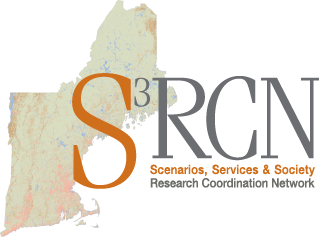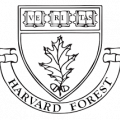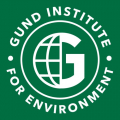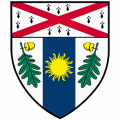You are here
S3 RCN
Summary
Purpose
The Scenarios, Services, and Linkages to Society Research Coordination Network (S3RCN) was established in 2014 by Kathy Fallon Lambert to develop and execute the New England Landscape Futures (NELF) project. The S3RCN worked with land-use stakeholders from across the region to identify drivers of landscape change, develop scenario narratives based on those drivers, and map the scenarios as land-use through the year 2060. The S3RCN supported researchers in using the NELF scenario maps to answer research questions related to land-use and ecosystem services. The final capstone meeting of the S3RCN, which featured presentations on the practical and research applications of the NELF scenario maps, was held as a co-meeting with the 2018 Regional Conservation Partnership Network Gathering on November 14 and 15, 2018. Although the S3RCN's activities are over, the NELF project continues with a focus on public engagement - visit the NELF Explorer to visualize possible futures and their impacts on ecosystem services!

Network
The S3RCN was led by a steering committee and worked with collaborators and consultants to complete its mission. These lists do not include all of the talented researchers and land-use professionals who gave their time and expertise to the S3RCN. Many thanks to all who contributed to the S3RCN's efforts!
Steering Committee
Sherburne Abbot, Syracuse University
Mark Borsuk, Dartmouth College
Charles Driscoll, Syracuse University
David Foster, Harvard Forest, Harvard University
Kathy Fallon Lambert, Harvard Forest, Harvard University
Rob Lilieholm, University of Maine, Orono
Spencer Meyer, Yale University
Taylor Ricketts, University of Vermont
Jonathan Thompson, Harvard Forest, Harvard University
Collaborators
Emily Bateson, Highstead
Michelle Johnson, U.S. Forest Service
Bill Keeton, University of Vermont
David Kittredge, University of Massachusetts
Emily McKenzie, World Wildlife Fund
Scott Ollinger, University of New Hampshire
Bob Perschel, New England Forestry Foundation
Keith Ross, LandVest
Erika Rowland, Wildlife Conservation Society
Joe Short, Northern Forest Center
Consultants
Pat Field, Concensus Building Institute: facilitation
Katie Theoharides, Theoharides Consulting: network coordination
Funding
Funding for the S3RCN and associated activities came from the National Science Foundation under grants NSF-DEB-13-38809, NSF-DEB-17-13307, and NSF-DEB-12-37491, and from Highstead.
Major Events
The S3RCN's funding primarily supported convening of different groups in support of the New England Landscape Futures project. Major milestones included developing the framework for the scenario building process, scenario building with stakeholders, webinars, and a capstone meeting. Materials (e.g. itineraries and summaries) are available in the materials archive section of this webpage.
Scenario Workshops
Scenarios to Solutions workshop (October 28-29, 2014) focused on sharing best practices for participatory scenario development and developed an 18-month action plan for the S3RCN with defined goals.
Scenarios to Simulations workshop (February 26-27, 2015) focused on identifying best practices for simulating qualitative scenario narratives as quantitative changes in land-use.
Linking Supply to Benefits in Ecosystem Service Modeling workshop (May 19-20, 2016) focused on sharing methods for linking models of ecosystem service supply with realized benefits at various temporal and spatial scales.
Scenario Development
The S3RCN convened six workshops -- one in each New England state -- with land-use stakeholders to build landscape scenarios for that state. The S3RCN then carefully combined common elements of state scenarios to form a set of regional, New England-wide scenarios. Read more about the process and outcomes of these scenario building workshops in the report Voices from the Land.
Capstone Meeting
The capstone meeting was a two-day event on November 14 and 15, 2018 in co-meeting with the Regional Conservation Partnership (RCP) Gathering.
Day 1 focused on how the NELF scenarios are being used to study ecosystem services. Scientists detailed their methodologies used to generate the scenario narratives and to simulate the stories to create spatial datasets. Then, researchers using the final data products explained their methods and results using the scenario data to assess impacts on ecosystem services including carbon storage, maple syrup production, wildlife habitat, water quality, and water partitioning. The day ended with a discussion of what we have learned and what more we can do with these unique datasets.
Day 2 focused on practical applications in a series of Future Scenarios workshops at the RCP Network Gathering. Three presentations built on each other to help participants better understand: land-use trends in our region, and why scenarios are helpful decision-making tools in our privately-owned, decentralized land-use system; the features and capabilities of the NELF Explorer; and how conservation organizations were using the scenarios in their work.
Archive of Materials
Data
Download the NELF scenario maps by joining the New England Landscape Futures group on Databasin, or view NELF maps through NELF Explorer.
Workshop Materials
Scenarios to Solutions
Participants and speaker biographies
Scenarios to Simulations
Participants and speaker biographies
Agenda with presentation links
Linking Ecosystem Supply and Benefits
Capstone Meeting
Highlights and takeaways from each day
Research Publications
Duveneck M.J. and J.R. Thompson. 2019. Social and biophysical determinants of future forest conditions in New England: Effects of a modern land-use regime. Global Environmental Change 55:115-129. DOI: 10.1016/j.gloenvcha.2019.01.009
McBride M.F., M.J. Duveneck, K.F. Lambert, K.A. Theoharides, J.R. Thompson. 2019. Perspectives of resource management professionals on the future of New England's landscape: Challenges, barriers, and opportunities. Landscape and Urban Planning 188:30-42. DOI: 10.1016/j.landurbplan.2018/10.019
Liang Y., M. Duveneck, E. Gustafson, J. Serra-Diaz, J.R. Thompson. 2018. How disturbance, competition and dispersal interact to prevent tree range boundaries from keeping page with climate change. Global Change Biology. DOI: 10.1111/gcb.13847
Thompson J.R., J.S. Plisinski, P. Olofsson, C.E. Holden, M.J. Duveneck. 2017. Forest loss in New England: A projection of recent trends. PLOS One 12(2):e0189636. DOI: 10.1371/journal.pone.0189636
Duveneck M.J. and J.R. Thompson. 2017. Climate change imposes phenological tradeoffs on forest net primary productivity. Journal of Geophysical Research - Biogeosciences 122:2298-2313. DOI: 10.1002/2017JG004025
Kittredge D.B, J.R. Thompson, L. Morreale, A. Short, L. Hutyra. 2017. Three decades of forest harvesting along a suburban-rural continuum. Ecosphere 8(7):e01882. DOI: 10.1002/ecs2.1882
McBride M.F., K.F. Lambert, E.S. Huff, K.A. Theoharides, P. Field, J.R. Thompson. 2017. Increasing the effectiveness of participatory scenario development through codesign. Ecology and Society 22(3):16. DOI: 10.5751/ES-09286-220316.
Note: McBride et al. 2017 contains a lot of information about the process and intermediate outcomes (e.g. state workshop results) of the NELF project. To help you navigate this 92-page publication, we created a PDF with links to relevant content. Download the PDF with cover page here.
Thompson J.R., C.D. Canham, L. Morreale, D.B. Kittredge, B. Butler. 2017. Social and biophysical variation in regional timber harvest regimes. Ecological Applications 27(3):942-955.
Duveneck M., J. Thompson, E.J. Gustafson, Y. Liang, A.M.G. de Bruijn. 2017. Recovery dynamics and climate change effects to future New England forests. Landscape Ecology. DOI: 10.1007/s10980-016-0415-5
Mallampalli V.R., G. Mavrommati, J. Thompson, M. Duveneck, S. Meyer, A. Ligmann-Zielinska, C.G. Druschke, K. Hychka, M.A. Kenney, K. Kok, M.E. Borsuk. 2016. Methods for translating narrative scenarios into quantitative assessments of land use change. Environmental Modelling and Software 82:7-20.
Thompson J.R., K.F. Lambert, D.R. Foster, E.N. Broadbent, M. Blumstein, A.M. Zambrano, Y.C. Fan. 2016. The consequences of four land-use scenarios for forest ecosystems and the services they provide. Ecosphere 7.
Thorn A.M., J.R. Thompson, J.S. Plisinski. 2016. Patterns and predictors of recent forest conversion in New England. Land 5.
Blumstein M. and J.R. Thompson. 2015. Land-use impacts on the quantity and configuration of ecosystem service provisioning in Massachusetts, USA. Journal of Applied Ecology 52:1009-1019.
Duveneck M.J, J.R. Thompson, B.T. Wilson. 2015. An imputed forest composition map for New England screened by species range boundaries. Forest Ecology and Management 347:107-115.







